Sustainability report 2024
Empowering communities
Next: Governance
Our team is passionate about creating and delivering inclusive projects and putting communities at the forefront of design and project delivery. We look for opportunities to integrate the knowledge and concerns of community elders, members, leaders, and youth into our projects.
We are committed to creating and delivering projects that benefit the communities where we live and work.
We believe in meeting people where they are, with the values they hold. Ultimately, our goal is to leave a positive legacy in communities—one greater than the initiatives or projects themselves. In doing so, we want our work to be a catalyst for long-term growth and to support decisions that allow our people, community members, and our clients to operate and prosper in our communities.
Community engagement and education
We strongly believe that community and Indigenous inclusion is a catalyst for long-term growth and reconciliation. Our continued commitment is to:
- Engage early, openly, and honestly in a sustained manner with local and Indigenous Peoples
- Build long-term and mutually beneficial relationships with local and Indigenous Peoples and businesses
- Promote opportunities, within our organization and with our clients, that foster engagement and participation with local and Indigenous Peoples to build social capital
- Respect the rights of Indigenous Peoples to maintain and strengthen their own institutions, cultures, and traditions, and to pursue their development in keeping with their needs and aspirations.
Every year, we take meaningful steps and action to advance our Global Indigenous Peoples and local communities policy, Partnership Accreditation in Indigenous Relations (PAIR) certification in Canada, Reconciliation Action Plan (RAP) in Canada and Australia, and Broad-Based Black Economic Empowerment (B-BBEE) certificate Level 1 in South Africa.
Global Indigenous Peoples and local communities policy
Our Global Indigenous Peoples and local communities policy recognizes the importance of building strong, inclusive, and respectful relationships with Indigenous Peoples and local communities globally, within our company, and where we work. The policy sets out commitments and goals to work toward meaningful engagement and positive outcomes that honor Indigenous Peoples’ rights, culture, and connection to the land.
In 2024, a collective of Hatch employees, consisting of Indigenous staff members and those who work in the Indigenous relations space, collaborated with our global directors to update this policy. Our goal was to provide a clear, well-structured plan to demonstrate a strong commitment to advancing Indigenous inclusion and socio-economic well-being.

Developing significant business and employment opportunities for First Nations communities
The BHP Jansen potash project is the largest private financial investment in the history of Saskatchewan, Canada, and is expected to generate approximately 8.5 million tons of potash per year when it begins production in 2026.
It’s already generating positive change for local Indigenous groups today.
To date, this initiative has resulted in C$1 billion in contract opportunities for local and Indigenous businesses.
As part of a joint venture with Bantrel, our team is supporting both the project and BHP’s commitment to provide significant contracting and procurement opportunities for First Nations communities. Our goal, which is directly connected to Canada’s commitment to economic reconciliation for Indigenous Peoples, is to advance these opportunities between BHP and Indigenous communities in a meaningful way.
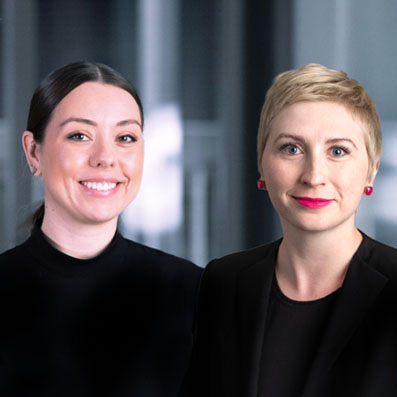
A focus on social procurement and Indigenous inclusion
Courtney and Britany are building long-term, collaborative relationships with Indigenous communities and businesses.
Their team participates in projects in various ways, including focusing on social procurement by supporting our clients in their pursuit for local and Indigenous inclusion, building and implementing measures in contracting and procurement systems to support these communities, and directly engaging with Indigenous communities and businesses to build relationships.
For Courtney, including Indigenous engagement as early as possible in the project stage is crucial.
“Investing time and energy to build mutual respect and trust with Indigenous Peoples and communities is essential,” said Courtney. “This includes respecting where an individual or community is at today, and acknowledging their unique priorities, vision, and values.
“All too often I have seen generalizations made about Indigenous Peoples and communities, which have influenced project planning, timelines, and objectives. If we truly want to move forward in reconciliation and develop reciprocal relationships that are focused on long-term sustainability, we need to invest the time needed to understand community-specific interests.”
Britany agreed, adding that economic inclusion is not just a checkbox, but a fundamental aspect of meaningful engagement.
“Through my work activities in local and Indigenous procurement, one of my most significant learnings from community engagement is that economic opportunities on projects for Indigenous communities flow from Indigenous rights, recognized and protected in Canada by Section 35 of the Constitution Act, 1982,” said Britany, who has worked at Hatch since 2023.
“I am looking forward to implementing our Reconciliation Action Plan activities to better align our company procurement and business efforts with economic reconciliation with Indigenous communities. One of the areas I’m most excited about is the development of an Indigenous Procurement Plan and Policy, which I think will enable change in purchasing to support economic opportunities for Indigenous businesses and communities.”
Reconciliation in action
Our reconciliation action plans build on our long-standing history of working with Indigenous communities globally.
Reconciliation Action Plan, Australia
We launched our Reflect RAP in Australia in 2023, which prepared us to engage in meaningful reconciliation. Developed in collaboration with Reconciliation Australia, the RAP places honesty, respect, and transparency at the core of its relationship with Indigenous Peoples.
We produced our Progress Report: Reflect Reconciliation Action Plan this year. The report takes the results from our Reflect RAP and outlines the positive impact that meaningful action can have while demonstrating that our organization is engaged and eager to continue its reconciliation journey. Our next step is to take what we have learned and enhance our engagement with Aboriginal and Torres Strait Islander peoples as we progress from a Reflect to an Innovate RAP. An Innovate RAP outlines actions for achieving a vision for reconciliation.
Reconciliation Action Plan, Canada
Our RAP is reconciliation in action—a roadmap and report that outlines our vision, commitments, and actions to foster meaningful relationships and lasting partnerships with Indigenous Peoples in Canada with a focus on four key areas of our organization: leadership, relationships, procurement and business, and employment.
The RAP reflects our response to the Truth and Reconciliation Commission’s Call to Action 92, which calls on the corporate sector to adopt the United Nations Declaration on the Rights of Indigenous Peoples as a framework for reconciliation.
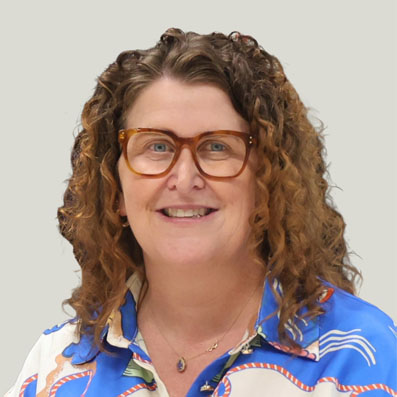
Enthusiastically passionate when it comes to reconciliation
For the last four years, Julie and other members of the Indigenous Engagement Committee (now referred to as the RAP working group) have been diligently preparing a roadmap for the four-part RAP process (Reflect, Innovate, Stretch, and Elevate) that will pave the way to strengthening relationships with Aboriginal and Torres Strait Islander people.
The working group was instrumental in implementing our Reflect RAP, which prepared Hatch to meaningfully engage in the reconciliation process. This year, the group helped lay the foundation to advance to the Innovate RAP, the second leg of the reconciliation journey.
In order to proceed with the Innovate RAP, we recognized that we needed to include Indigenous Peoples in the group to guide us to the next phase.
“We currently have zero identified Indigenous staff members in Australia, so we went to IWIMRA, an organization we've worked with over the last five or six years and partnered with them. They run mental health workshops, yarning circles [discussion groups], and other programs that are very important for Indigenous women in the community. From an Australian point of view, women are the backbone of a community.”
Socializing our Reconciliation Action Plan at ANEDO 2024
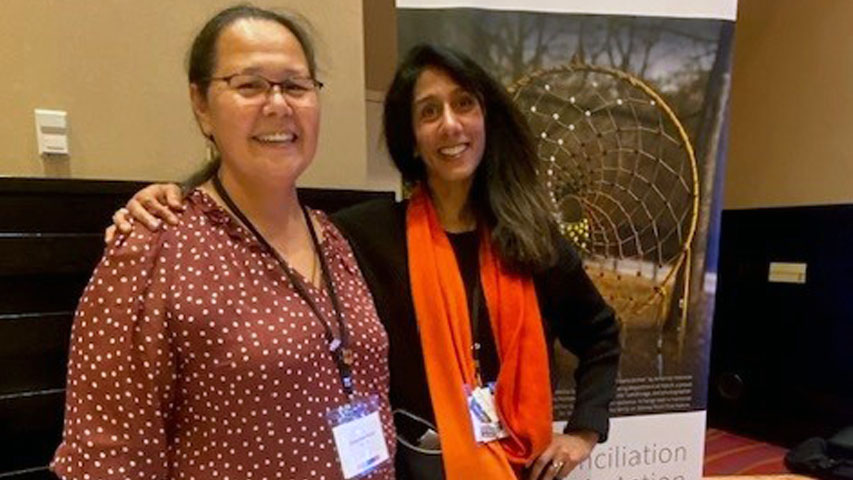
We were delighted to be part of the Anishinabek Nation Economic Development (ANEDO) Forum, which took place October 21–23, 2024 on the Chippewas of Rama First Nation traditional territory in Ontario.
The event was an excellent opportunity for us to network, “ground-truth” our RAP, and continue to build relationships with the Anishinabek Nation Ontario Indigenous communities, which include 39 First Nations.
Partnership Accreditation in Indigenous Relations (PAIR) certification progress
As a credit to our previous engagement with Indigenous communities, we became the very first engineering firm to attain PAIR certification, which we’ve held since 2013. Hatch is a PAIR bronze-level certified business with the Canadian Council for Indigenous Business (CCIB). Indigenous engagement is ingrained in how we do business every day, from project planning and project execution, to sustaining and expanding inclusion throughout our entire organization. With a decades-long history of working with Indigenous communities across Canada, and globally, we continue to make strides to be active participants through economic reconciliation.
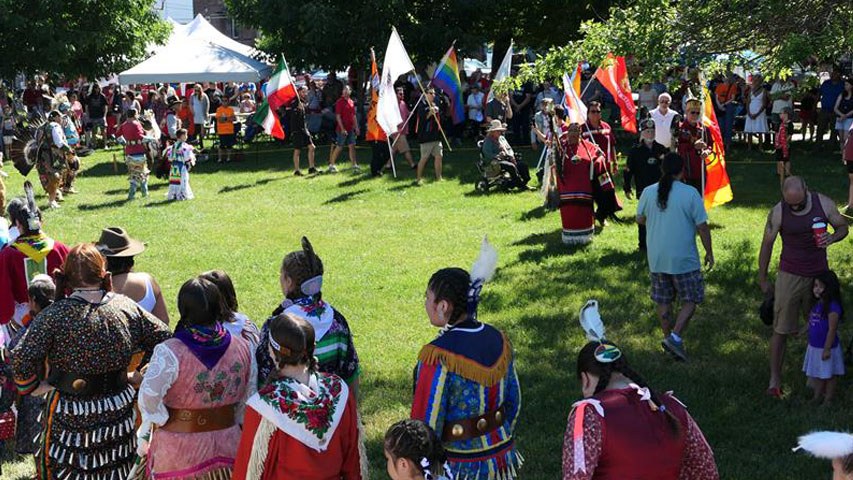
Bringing an Indigenous-led approach to sustainable development
On July 22, 2024, with our partners at the North Shore Mi’kmaq Tribal Council (NSMTC), we announced the exploration of a JV opportunity for Canada’s clean energy and infrastructure sectors. The intent is to bring an Indigenous-led approach to sustainable development for the betterment of the next seven generations.
We have collaborated successfully with the NSMTC on various engagements over the past 25 years. This JV solidifies our relationship to provide professional services that leverage our capabilities:
- Feasibility/front-end studies
- Civil site development: geotechnical, design/CAD, site survey, traffic studies, laboratory analysis
- Environmental, sustainability, and community engagement services
- Project management
- Business advisory services: market studies and development agreements.
The JV, named Wellugwet Technical Services, is founded on the principle of responsible land and resource development. “Wellugwet”, a Mi’kmaq word meaning “do good work, do well, or succeed” was chosen through consultation with NSMTC chiefs, elders, and leadership.
The partnership provides access to new markets and supports reconciliation with the Indigenous Peoples of Canada.
The signing of the letter of intent, which took place at the Natoaganeg Band Office Assembly Hall in New Brunswick, is a major milestone on the path to execution of the JV and eventual commercial operation.
“This intended joint venture will combine Indigenous vision and leadership with technical capacity, leveraging the collective strengths of the NSMTC and Hatch. Our Tribal Council strives to create opportunities for our young people, and we value the chance to collaborate with partners like Hatch. Together, we are embarking on a journey of shared success for the next seven generations.”
— Jim Ward, general manager, North Shore Mi’kmaq Tribal Council
B-BBEE level 1 in South Africa
We have maintained our Level 1 B-BBEE rating from the South African National Accreditation System for embracing diversity as the catalyst to grow the economy by rectifying the exclusion of previously disadvantaged groups in South Africa.
We began this transformational journey in 2001, well before the legislation was put into place. Since then, we have consistently updated its transformation plan to evolve with the needs of a changing economy, and have exceeded the targets in many areas, including supplier development, skills development, and management control.
Hatch and the ReStory Foundation: Together restoring the lives of vulnerable children and young adults
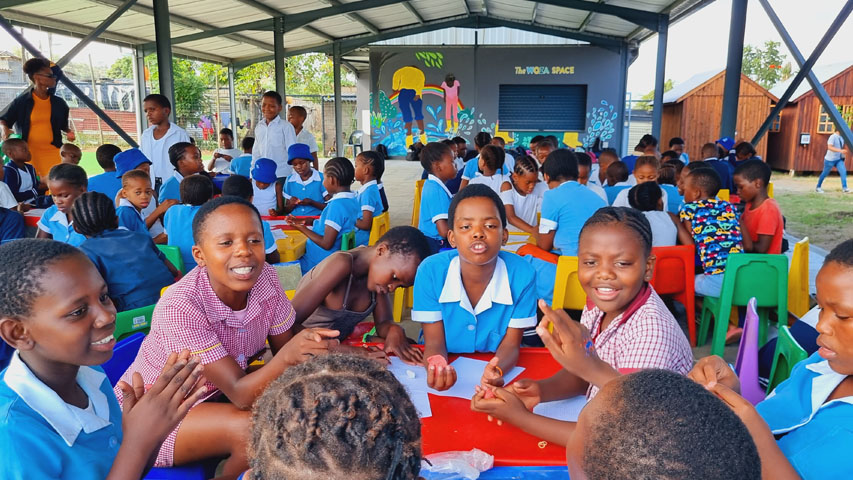
The needs in South Africa are overwhelming, with the worst inequality in the world, nearly one in three people unemployed, more than half the country below the national poverty line, and education levels that do not bode well for the future. Based in one of the most materially poor communities in South Africa, Bhambayi (Inanda), the ReStory Foundation empowers the most marginalized to be courageous agents of change in their own lives, in their communities, and in the nation as a whole. The strongest focus is on orphans and vulnerable children and young adults. Given this context, we have chosen to invest in the ReStory Foundation to ensure their corporate social investment brings sustainable change into the future.
The Hatch-ReStory partnership started in 2023 with our investment in the Phakama Skills Development Course for unemployed young adults. Continuing our partnership into 2024, we chose to invest in the 250 orphans and vulnerable children supported by the ReStory Foundation, with a focus on the Ignite Learning Programme.
To assist entrepreneurs, we developed and refined our Supplier Development (SD) program. We have worked with 13 SD partner organizations, eight of which are black-women-owned and two that are youth-owned. In the past 14 years, Hatch has invested R83 million into enterprise and SD programs.
We are committed to training and supporting our future engineers, constructors, technologists, and inventors. We’ve invested R287 million in skills development, provided 369 bursaries to students, and hired 328 graduates. This commitment to our future extends around the globe.
Our success results from a focused transformation plan aimed at improving all five elements of the scorecard continuously.
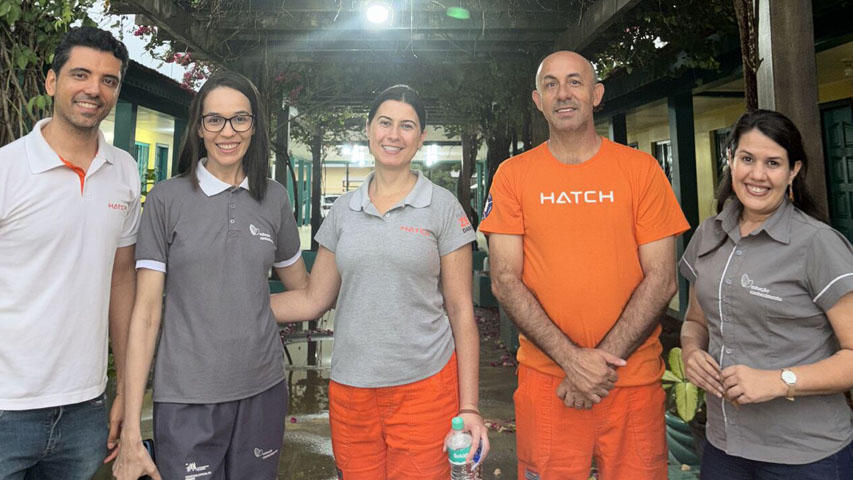
Eradicating extreme poverty in Brazil
We signed a new partnership agreement with Vale focused on positive change for communities in Brazil. Specifically, to help Vale reach its goal of lifting 500,000 people out of extreme poverty by 2030.
Our two organizations share a common vision to create lasting, positive effects in the communities in which we work. Together, we are working on the Onça Puma furnace 2 project located in Brazil’s Pará state.
The Onça Puma furnace 2 project includes the Partilhar Program, an initiative between Vale and its suppliers to foster the socioeconomic development of the local communities. Through the Community Value Index (CVI), the mining company evaluates the contribution of suppliers to the communities. The higher the CVI, the more competitive the supplier can become in Vale's contracting processes. Currently, the CVI is calculated considering four levers: local employment, wage bill, local expenditures, and social investments.
We are supporting the assessment of the social situation of families in Tucumã and Ourilândia do Norte based on education, health, nutrition, infrastructure, and income. We are also developing an action plan to provide vulnerable families with access to essential necessities and social programs.
This work aligns with the first of the United Nations Sustainable Development Goals, which calls for an end to poverty.
"It is a great honor for me to be involved in a project with high social impact. After more than 13 years working on social projects for mining companies, this is the first time I have participated in an initiative that’s main objective is to lift people out of extreme poverty. The program is pioneered in Brazil, and I hope it will inspire other companies, organizations, and public authorities.”
— Joao Paulo Moreira Rabelo, senior analyst, Community Engagement and Social Performance, South America
Employee-led community initiatives
Moose Hide Campaign
A Moose Hide Campaign virtual workshop was held for our Canadian offices. The campaign is an Indigenous-led grassroots movement to end gender-based violence against Indigenous women and girls. The event included the distribution of moose hide pins and a presentation by Raven Lacerte, campaign co-founder, and David Stevenson, campaign CEO.
We participate in the campaign because we believe in achieving no harm and living our commitments with integrity. Many of our projects are located on Indigenous Traditional Territories, including remote areas near Indigenous communities. As a commitment to being a diverse and inclusive company, we must also live out these commitments outside the workplace. By participating in the Moose Hide campaign and raising awareness, we are engaging great people who make a difference.
Hatch Curator of Indigenous Art and Culture
Toronto’s Royal Ontario Museum (ROM) welcomed Rhéanne Chartrand as the inaugural Hatch Curator of Indigenous Art and Culture, embarking on a journey of respectful collaboration and reconciliation with Indigenous communities.
In her new role, Rhéanne conducts research for the museum and develop educational and community outreach programs, and Indigenous-focused exhibitions. In addition, she collaborates with community stakeholders on the repatriation of historical Indigenous belongings and artifacts from the current collection at the ROM.
Additional employee-led initiatives include:
- Indigenous employee circles
- Hatch Saskatoon Celebrates National Indigenous People’s Day
- National Day for Truth and Reconciliation, Canada
- Northern Ontario Anishinabek Nation Workshop
- Día de la Raza, Colombia
- Rise again hunger, Johannesburg
- Mandela day, South Africa
- Johannesburg student job shadow day
- Digital classrooms powered by Solar Energy and Modern STEM Labs in government schools, India.
We take every opportunity to assist and contribute to our local communities when and wherever we can, in areas like clean energy, student education, and philanthropic efforts. Learn more here.
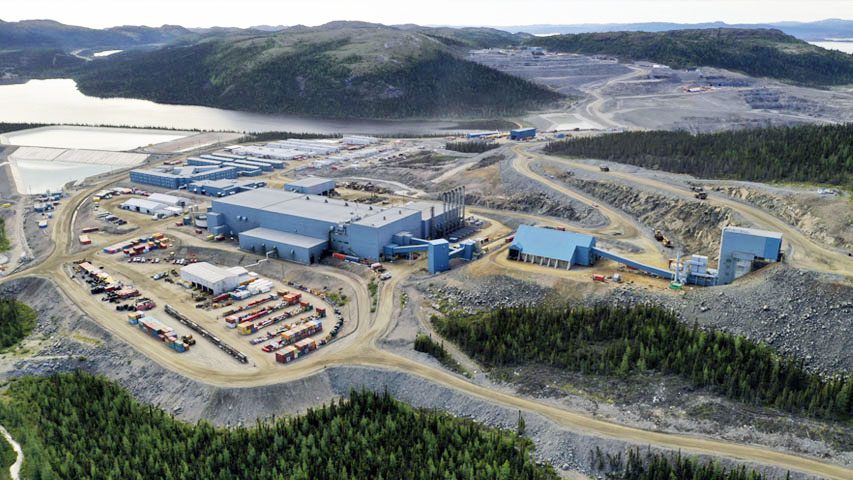
Common vision: Creating positive change on projects and for communities
Vale is pursuing one of its most challenging Canadian projects to date: converting Voisey’s Bay from an open-pit-only operation to two new underground mines.
To meet this challenge together, we formed a joint venture (JV) with Sikumiut Environmental Management Ltd. (SEM), an Inuit-owned environmental company based in St. John’s, Newfoundland and Labrador, in 2016. Hatch has a long, collaborative history with Vale, having partnered since the inception of the Voisey’s Bay surface mining operation in 1999. All three of our companies share a common vision of creating positive change on projects we work on and in the communities with which we engage. At Voisey’s Bay, this mindset led to a commitment to conduct 90% of the work in the province of Newfoundland and Labrador, providing training and employment opportunities for local Indigenous communities and prioritizing safety throughout the project.
The mining operation is located on the traditional and territorial land of the Innu and Nunatsiavut Inuit Indigenous communities. Vale, with the support of the SEM-Hatch JV, worked towards achieving its Indigenous employment and training objectives as set out in the Impacts and Benefits Agreements. The SEM-Hatch JV, registered as an Inuit business, emphasized the importance of Inuit and Innu participation and, together with Vale, aimed to maximize Indigenous content in the project work through meaningful engagement. During the expansion, Indigenous employment increased, and 65% of all procurement contracts for the project were awarded to Indigenous-owned businesses.
A training and mentorship program, created together with SEM, has been in place for eight years and provides a mechanism to enhance Indigenous involvement in the Voisey’s Bay operation well beyond engagement of an existing Inuit or Innu business.
Ultimately, the Voisey’s Bay expansion set a new standard for how mining projects can be executed with a deep commitment to safety, sustainability, community engagement, and Indigenous economic reconciliation—demonstrating that even the most daunting obstacles can be transformed into opportunities for growth and positive change.
We are very proud of this success and continue our commitment to the SEM-Hatch JV by working together with other mining clients and developing future joint venture business opportunities.
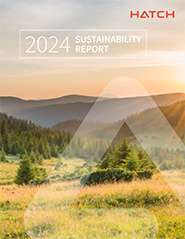 Full report PDF
Full report PDF